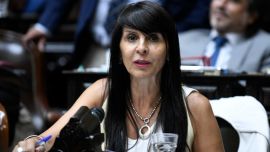Argentina is famous for its stark political polarisation, but even the storm clouds have to part once in a while. Leaders from the ruling and opposition coalitions, for one rare moment, on just one issue, seem to be in agreement. Whisper it, but both sides have declared they will support a new financing programme with the International Monetary Fund in Congress.
Naturally, this being politics, any support is conditional. For Frente de Todos and President Alberto Fernandez, the deal with the multilateral lender cannot acknowledge even a hint of austerity, especially if he is to keep his coalition’s hardliners quiet. For Juntos por el Cambio, the government must be forthcoming with “the fine print” and understand that the “responsibility” lies with the Casa Rosada. In addition, they will not accept tax increases as part of any accord.
President Alberto Fernández's government announced late January that it had reached an "understanding" with the IMF on key policies that would allow it to reach a new financing agreement to restructure Argentina’s US$44.5-billion debt with the multilateral lender.
Under the new deal, officials have committed to progressively reducing its fiscal deficit from three percent of GDP in 2021 to 0.9 percent in 2024. The gradual reduction – to 2.5 percent in 2022 and 1.9 percent in 2023 – would "not prevent the recovery" of the economy, according to the government.
An IMF spokesperson said this week that IMF staff are working closely with officials in Buenos Aires to secure an agreement on a new financing deal "as quickly as possible."
The government has a more specific target – it wants a staff-level agreement before the March 22 maturity of a US$2.85-billion payment that the country can no longer afford.
On Friday, the president met with Guzmán and later, Argentina's Ambassador to the United States Jorge Argüello, to discuss how talks were going.
‘Ongoing’
Discussions over a new programme “are ongoing, fairly intensively," but there is no timeline for reaching an agreement, said IMF spokesman Gerry Rice this week.
He also said there was no date set for the visit of an IMF mission team to Argentina. Nor would he answer whether the IMF would agree to postpone upcoming debt maturities if a new agreement was not approved by March. Any deal would require final approval from the Fund’s board, he insisted.
In recent weeks, the government has paid just over US$1 billion in principle and interest on its loan, but is seeking to restructure its remaining payments, which are due this year and next.
Fernández, speaking at an event promoting public works projects on university campuses, promised that Argentina would "meet its obligations" to the IMF, while stressing that any deal must not contain “adjustments.”
"We live in a country that owes a lot of money and is dangerously committed to an international credit organisation, and when it comes to seeing how to meet its obligations, this will not come at the cost of adjustments to the people, to public works, to education and, even less so, to science and technology," said the Peronist leader.
Analysts viewed the remarks as a clear message to the hardline Kirchnerite sector of the ruling coalition, some of whom have already spoken out publicly against an agreement.
Last week, Máximo Kirchner resigned his position as Frente de Todos’ caucus chief in the lower house, with the lawmaker declaring that he could not support a deal with the IMF.
‘No doubt’
Any new programme will have to be ratified by Congress, where the ruling coalition is the largest force, but does not have a majority. Therefore it will need the support of allies and some opposition lawmakers.
Speaking on Thursday, Lower House Speaker Sergio Massa said he had “no doubt” that the deal would be approved by both chambers. The Frente Renovador leader said that he remained optimistic, despite Kircher’s resignation and the silence of the lawmaker’s mother, Cristina Fernández de Kirchner, Argentina’s powerful vice-president.
"I have no doubt that Argentina’s parliament will approve the agreement Argentina is discussing with the IMF," Massa said at a meeting with agricultural leaders.
Fernández de Kirchner, who served two terms as president from 2007 to 2015, has yet to publicly comment on the agreement, though local media report she did not approve of her son’s resignation.
Massa warned Thursday that if the bill does not win congressional support, the 2018 agreement signed by the Cambiemos administration will continue to be in force, meaning payments totalling US$18 billion will be due this year.
President Fernández has repeatedly said that Argentina cannot afford to pay. Last week, IMF managing director Kristalina Georgieva called for a focus on finalising the terms of the agreement and implementing it, saying there is "no alternative."
"Our main focus is to get Argentina off this very dangerous path of high inflation," she told reporters.
Opposition support
With IMF officials insisting on support across the aisle, the government is anticipating support from the opposition.
In a statement, Juntos por el Cambio mayors in Buenos Aires Province said Friday that they would support a deal "in order to avoid default” and on the condition that Governor Axel Kicillof does "not use the agreement as a pretext" to cut funds to opposition regions.
Following a meeting of key coalition leaders in Olivos on Thursday, PRO party leader Patricia Bullrich emerged to declare that Juntos por el Cambio “is never going to push Argentina into default.
At the summit, attended by ex-president Mauricio Macri and Buenos Aires City Mayor Horacio Rodríguez Larreta among others, all had agreed that “the principle of the government's understanding with the IMF is positive,” said the coalition’s point man on the issue, former vice-presidential candidate Miguel Ángel Pichetto.
PRO lawmaker Pablo Tonelli also said that the opposition would support the deal, provided it is “reasonable and beneficial for the country.”
"Our predisposition is to go along, because default is the worst of the alternatives,” he added,
He warned, however, that the opposition would not “co-govern or become partners with the government in the running of the nation.” A new deal with the IMF is “the government's responsibility,” said Tonelli.
One politician who will not be supporting the deal is outspoken libertarian lawmaker Javier Milei.
"I am going to vote against Guzmán's project because I consider that it has theoretical and empirical inconsistencies and a profound immorality in favour of the political caste," he said in a radio interview with Metro 95.1 FM.
“La Cámpora wants the IMF to pay for the adjustment, and the pigeons of Juntos por el Cambio want the private sector to pay for it," declared the La Libertad Avanza deputy.





















Comments